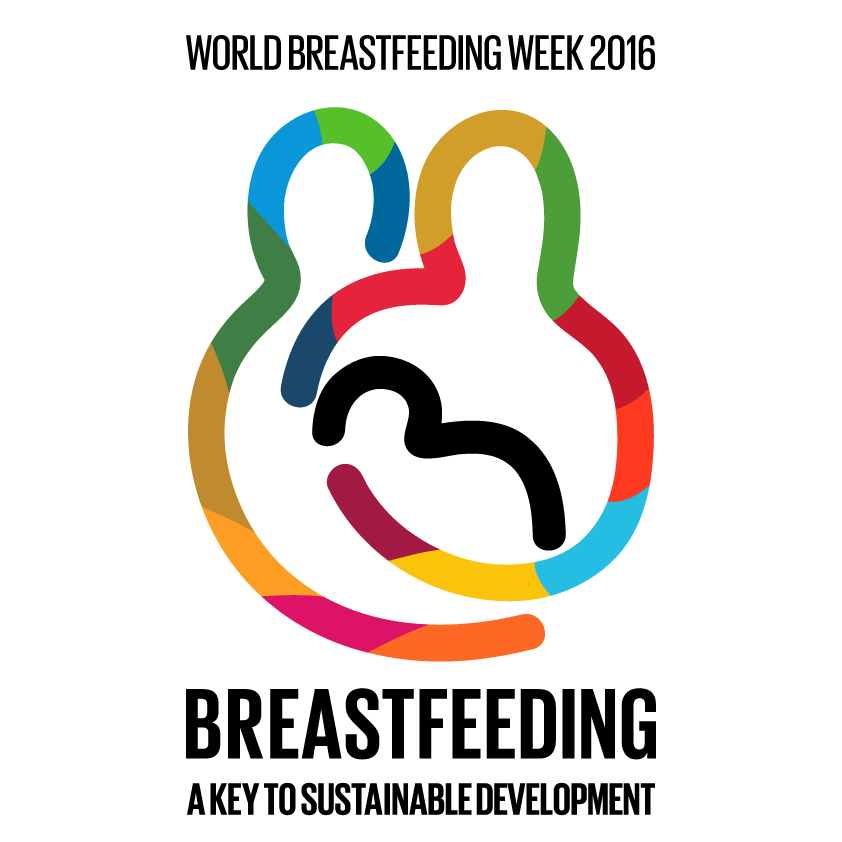Sustainable development — that’s a mouthful. Breastfeeding isn’t usually what comes to mind when we think of sustainable development, but according to materials from the World Alliance for Breastfeeding Action — which coordinates World Breastfeeding Week, August 1-6 — it should:
In September 2015, the world’s leaders committed to 17 goals aimed at ending poverty, protecting the planet, and ensuring prosperity. Together, they form the Sustainable Development Goals.
We all have a part to play in achieving these goals by 2030.
The World Breastfeeding Week 2016 theme is about how breastfeeding is a key element in getting us to think about how to value our well-being from the start of life, how to respect each other, and how to care for the world we share.
Sustainable development is essentially about ecology, economy, and equity. Here are links between each of the 17 Sustainable Development Goals and breastfeeding:
- No poverty — Breastfeeding is a natural and low-cost way of feeding babies and children. It is affordable for everyone and does not burden household budgets compared to artificial feeding. Breastfeeding contributes to poverty reduction.
- No hunger — Exclusive breastfeeding and continued breastfeeding for 2 years and beyond provide high-quality nutrients and adequate energy and can help prevent hunger, under-nutrition, and obesity. Breastfeeding also means food security for infants.
- Good health and well-being — Breastfeeding significantly improves the health, development, and survival of infants and children. It also contributes to improved health and well-being of mothers, both in the short- and long-term.
- Quality education — Breastfeeding and adequate complementary feeding are fundamentals for readiness to learn. Breastfeeding and good quality complementary foods significantly contribute to mental and cognitive development and thus promote learning.
- Gender equality — Breastfeeding is the great equalizer, giving every child a fair and best start in life. Breastfeeding is uniquely a right of women, and they should be supported by society to breastfeed optimally. The breastfeeding experience can be satisfying and empowering for the mother as she is in control of how she feeds her baby.
- Clean water and sanitation — Breastfeeding on demand provides all the water a baby needs, even in hot water. On the other hand, formula feeding requires access to clean water, hygiene, and sanitation.
- Affordable and clean energy — Breastfeeding entails less energy when compared to formula production industries. It also reduces the need for water, firewood, and fossil fuels in the home.
- Decent work and economic growth — Breastfeeding women who are supported by their employers are more productive and loyal. Maternity protection and other workplace policies can enable women to combine breastfeeding and their other work or employment. Decent jobs should cater to the needs of breastfeeding women, especially those in precarious situations.
- Industry, innovation, and infrastructure — With industrialization and urbanization the time and space challenges become more prominent. Breastfeeding mothers who work outside the home need to manage these challenges and be supported by employers, their own families, and communities. Crèches near the workplace, lactation rooms, and breastfeeding breaks can make a big difference.
- Reduced inequalites — Breastfeeding practices differ across the globe. Breastfeeding needs to be protected, promoted, and supported among all, but in particular among poor and vulnerable groups. This will help to reduce inequalities.
- Sustainable cities and communities — In the bustle of big cities, breastfeeding mothers and their babies need to feel safe and welcome in all public spaces. When disaster and humanitarian crises strike, women and children are affected disproportionately. Pregnant and lactating women need particular support during such times.
- Responsible consumption and production — Breastfeeding provides a healthy, viable, non-polluting, non-resource intensive, sustainable, and natural source of nutrition and sustenance.
- Climate action — Breastfeeding safeguards infant health and nutrition in times of adversity and weather-related disasters due to global warming.
- Life below water — Breastfeeding entails less waste compared to formula feeding. Industrial formula production and distribution lead to waste that pollutes the seas and affects marine life.
- Life on land — Breastfeeding is ecological compared to formula feeding. Formula production implies dairy farming, which puts pressure on natural resources and contributes to carbon emissions and climate change.
- Strong peace and justice institutions — Breastfeeding is enshrined in many human rights frameworks and conventions. National legislation and policies to protect and support breastfeeding mothers and babies are needed to ensure that their rights are upheld.
- Partnerships for the goals — The Global Strategy for Infant and Young Child Feeding fosters multi-sectorial collaboration and can build upon various partnerships for support of development through breastfeeding programs and initiatives.
Looking for ways to spread the word? WABA provides downloadable materials through World Breastfeeding Week.


One thought on “WBW 2016: What does breastfeeding have to do with sustainable development?”